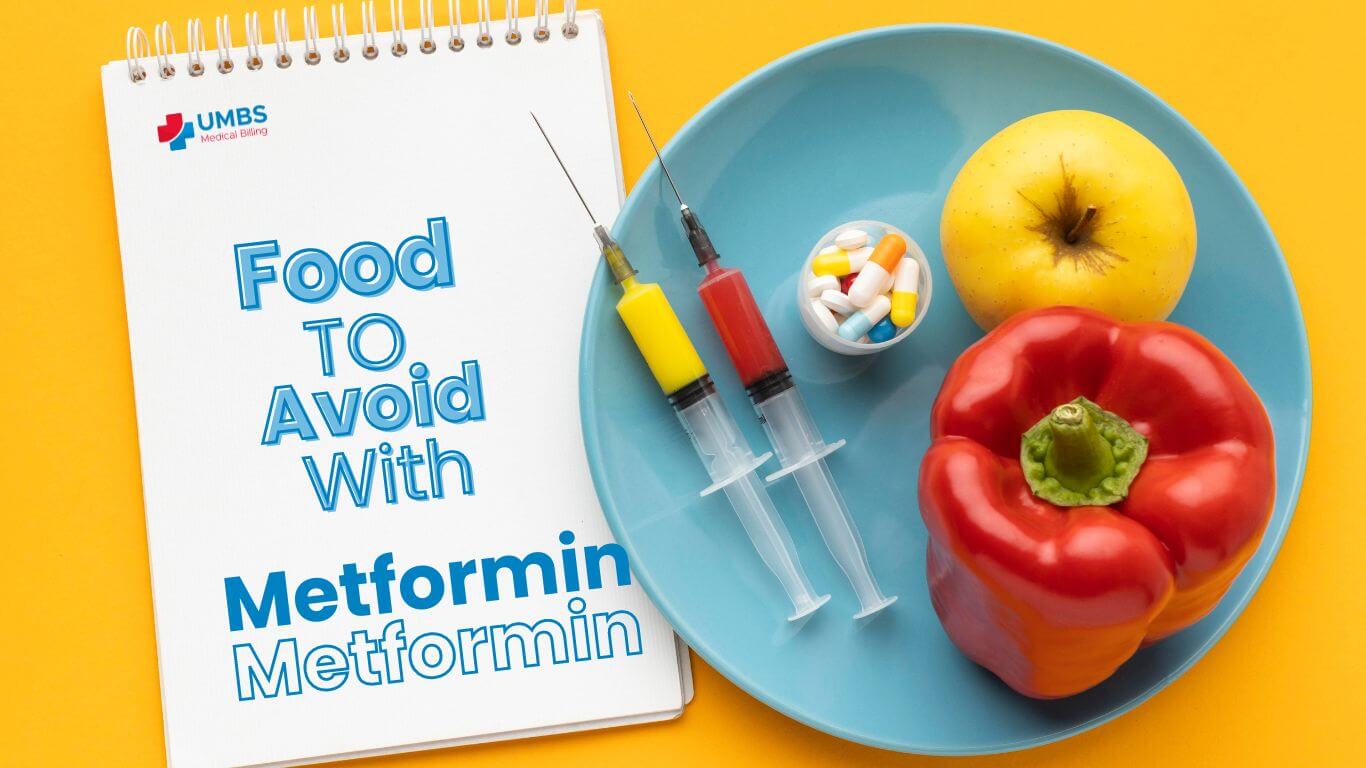Metformin is a medicine to lower blood sugar levels. Practitioners prescribe this drug to their patients with diabetes. However, for its optimum benefits, you should avoid many foods while taking metformin. We will discuss those foods in this article.
Furthermore, foods that raise your blood sugar levels overcome the benefits of this medicine; therefore, there are various foods that you need to avoid while taking metformin.
Key takeaways:
- Metformin lowers blood sugar levels in people who have diabetes to improve their overall health condition.
- You should avoid some foods high in sugar, like sodium, saturated fats, simple or refined foods, high sodium foods, alcohol, excessive fiber, and processed foods, for the best results of metformin.
- To minimize the side effects of taking metformin, you can take it with meals or take advice from your doctor on its dose adjustment.
Metformin is an FDA approved medicine for treating type 2 diabetes. It is an approved and successful medicine for lowering blood sugar levels. Its impacts increase with diet control and exercise. Although metformin is only approved for treating type 2 diabetes, it has various other benefits and uses, for example, treating polycystic ovary syndrome, gestational diabetes, and drug-induced weight gain.
Metformin improves your blood sugar levels and increases your body’s insulin sensitivity, which decreases your risk for heart disease, stroke, and organ failure.
Most people don’t have any side effects from taking metformin, as it is generally well-tolerated. However, it can cause digestive side effects like diarrhea and vomiting in some individuals. These side effects can be limited by eating the right amounts of foods every day that improve metformin’s overall effectiveness.
Here are some foods you should avoid while taking metformin:
- Simple or refined carbs
- High sugar foods
- High sodium foods
- Alcohol
- Excessive fiber
- Processed foods
- Saturated fats
Alcohol makes metformin less effective because both are metabolized in the liver. Many foods are recommended to avoid because these specific foods can cancel out the effects of metformin’s benefits.
Simple and refined carbs
Refined carbs like white bread, white rice, sweetened beverages, pasta, and muffins can increase blood sugar levels, making metformin less effective at controlling blood sugar levels.
It is suggested to take foods with complex carbohydrates, for example, whole grain foods, oatmeal, white bread, and brown rice, along with proteins and healthy fats, to improve blood sugar levels while taking metformin.
High-sugar foods:
Foods high in sugar increase insulin resistance, which makes metformin less effective. The recommended daily limit for sugar intake is six teaspoons for women and nine teaspoons for men. This looks easy, but added sugar is available in many of our foods and drinks. Even healthy foods like yogurt have extra amounts of added sugar. Similarly, salad dressing and ketchup also have added sugar. Therefore, you should take these foods cautiously. You can take regular coffee, but avoid sugary coffee drinks.
It is also important to note that natural sugars don’t affect your blood sugar levels in the same way as added sugars do; therefore, it is fine to eat fruits and vegetables in moderate amounts with a higher sugar content.
High Sodium Foods:
People who are taking metformin should avoid high sodium foods like smoked meats, frozen dinners, processed foods, and canned vegetables, as they cause problems for people taking metformin because they are insulin-resistant and at a higher risk of heart disease.
The recommended sodium intake per day is 2300 mg for healthy adults, but for diabetic, high blood pressure, or kidney disease patients, the recommended limit is 1500 mg per day. If you are taking metformin, it is a good idea to follow a low sodium diet by cooking more often at home and avoiding processed foods.
Saturated fats:
Saturated fats can increase inflammation and reduce insulin resistance, which overcomes the effects of metformin. Common sources of saturated fats include red meat, cheese, butter, and dairy products like ice cream, fried foods, baked goods, and coconut oil. You don’t have to avoid saturated fats completely. The suggested saturated diet percentage that you can take is 10% or less of your daily calories.
Alcohol:
It is important to restrict alcohol consumption to one to two drinks per day, as excessive alcohol will raise your blood sugar levels, stress your liver, and reduce the effects of metformin on lowering your blood sugar levels. Too much alcohol intake on a regular basis with metformin can cause lactic acidosis. It is a condition in which more lactic acid builds up in your bloodstream.
Excessive Fiber:
Although fiber is good for people with diabetes, taking too many fiber-rich foods affects the absorption of metformin, and as a result, it reduces the ability to control blood sugar levels effectively.
Eating fiber steadily is better than drinking enough water. It is not necessary to avoid high-fiber foods completely, but you should be cautious about consuming excessive amounts in one meal. High-fiber content foods include apples, legumes, leafy greens, kiwi, brown rice, bran cereals, and popcorn.
Processed foods:
Processed foods are those that are no longer in their natural state in some way. These include milling, cutting, pasteurizing, cooking, heating, canning, and freezing foods. All processed foods are not bad. Therefore, look at a food’s nutrition label, understand how processed foods can affect the overall nutritional value, and eat them accordingly in a calculated portion.
If you eat ultra-processed foods with large amounts of sodium, added sugar, and saturated fat, they can have a negative impact on your health. These foods can affect metformin’s ability to lower blood sugar levels and can lead to weight gain.
Frequently asked questions
Here are frequenlty asked questions regarding metformin and it usage:
How do herbs and supplements affect metformin?
Extended use of metformin may lower vitamin B12 levels, and you may add vitamin B12 to your diet as its lower levels cause fatigue and numbness. If you have been taking metformin for a long time, Dr. Quinones recommends talking to your doctor about monitoring your B12 levels.
Ginseng is a supplement that you may want to avoid, as its use with metformin increases its effects on blood sugar levels. Therefore, if you take both medicines side by side, monitor your blood sugar levels more frequently to ensure safe usage.
What foods should you eat while taking metformin?
Foods to eat while taking metformin include any foods that help lower your blood sugar. These include lean proteins, fresh vegetables, and healthy fats such as nuts, olive oil, nut butter, avocados, and fish. You can also include foods like whole grain bread, seeds, and fruits like berries in your diet to naturally reduce blood sugar levels.
Does metformin cause any side effects?
Metformin can help people with diabetes lower their blood sugar levels, but it can also cause digestive symptoms, changes in bowel habits, diarrhea, or nausea. It is suggested to take metformin with meals, stay hydrated, start with a lower dose, and then slowly increase the amount of metformin you take over time. If you face severe side effects while taking metformin, seek medical attention from an experienced doctor.
What happens if you eat sugar while taking metformin?
Sugar intake increases glucose levels and reduces the benefits of metformin. You not only need to limit the direct sugar, but you also have to keep an eye on hidden sugars in processed foods and drinks.
Can we take metformin with coffee?
There is no significant evidence that coffee messes up metformin, but taking too many caffeinated drinks might cause hydration issues; therefore, taking coffee in moderation is better.
How soon will metformin benefits become noticeable?
You may notice improvement in blood glucose control in 1 to 2 weeks. However, you can see the full benefits in 2 to 3 weeks.
Can metformin cause constipation?
Metformin does not cause constipation; instead, it may cause diarrhea as a side effect in some individuals. If you see constipation with metformin, you can discuss symptoms with a healthcare professional for potential adjustments in the treatment plan.
Like this? Signup to ournews letters to get valuable health tips or contact us directly at any time. We will be more than happy to assist you.






